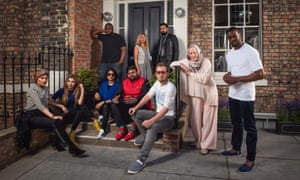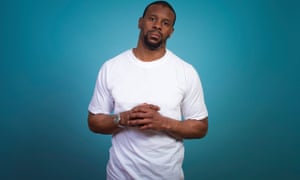
It is a familiar premise. Ten strangers holed up in a house, including in this case a part-time model, a comedian, a gay man and a former boxer. But on this occasion there will be no evictions or tearful debriefings with Davina McCall.
BBC2’s documentary Muslims Like Us has been described as the “Muslim Big Brother”, and in its own way it is as groundbreaking as the original BB concept which, for a few years, transfixed late-night television audiences.
Filmed over nine days, the two-part documentary will be broadcast next week. The BBC describes it as a “social experiment” looking at the diversity of the Muslim experience in Britain.
The project has already sparked controversy through the inclusion of the Islamist boxer Abdul Haqq, formerly Anthony Small, who has expressed support for Islamic State in the past. But Muslim groups are lining up to support what they see as a much-needed portrayal of diversity on national television.
Fiyaz Mughal, founder of Tell Mama, the charity that provides support to victims of anti-Muslim hate crimes, said: “We welcome a show which demonstrates the pluralism within Muslim communities and humanises them. In the current climate this is warmly welcomed.”
A spokesperson for the Muslim Council of Britain said it was looking forward to the airing of the programme, describing it as sharing a “safe space” for discussion and debate on topical issues of difference. “It will be an opportunity for the rest of the nation to have an inside view of the broad diversity of Muslims living in the UK, and that we are all different in our own way, with individual tastes and choices in lifestyle, but we can still share the same faith.”
Participants in the programme are seen in various scenarios, from a night out at karaoke to setting up a stall handing out leaflets on Islam to passers-by in York. Meanwhile debates take place on everything from race and sexuality to who should do the washing up.
The programme-makers say their aim is to create a microcosm for the diverse cultures and opinions within the Muslim community.
“We wanted to tap into the conversations happening within the Muslim community and their struggle to define what it means to be a British Muslim,” said Mobeen Azhar, the series producer. “Many Muslims feel they are in the spotlight and have to justify themselves constantly. We explore the diversity within the community and issues such as race and sexuality, but in a very raw, human way.”
The programme was made by Love Productions, which itself is no stranger to controversy. It has become better known for the contentious sale of its biggest hit, the BBC’s Great British Bake Off, to Channel 4. It was also behind Benefits Street, the 2014 Channel 4 documentary series about a street in Birmingham where 90% of the residents were said to claim state benefits. It resulted in hundreds of complaints to the police, Channel 4 and the media regulator Ofcom.

The decision to include Haqq was not taken lightly, said Fatima Salarie, senior commissioning editor for the BBC. “We realised we had to represent this voice because it does exist within the Muslim community, and it would have been wrong to pretend it doesn’t or fail to address it.”
Viewers get a taste of things to come in the documentary’s opening scene when Haqq greets the first housemate, a 27-year-old teacher Mehreen Baig, politely before presenting her with a handout about why free mixing between the sexes is forbidden in Islam.
Baig said: “I entered the show to represent the middle girl, not too liberal, not too conservative. When people think of Muslim women, there’s a stereotype of us being repressed and submissive. Someone like me doesn’t come to mind – a normal girl, with a career who watches X Factor and fasts at Ramadan.
“We are the majority, and unfortunately our voice is unheard. My presence in the show challenges that stereotype. I’m independent and educated, yet my life is very much moulded by my religious values. I’m proof that there can be, and is, a balance between both.”
Muslims Like Us is something of a gamble for the BBC. A report commissioned by the broadcaster this year was critical of the corporation’s concentration on Christianity at the expense of other religions. Muslims Like Us could be seen as a positive move towards representing other faiths but the Big Brother-style approach may garner more criticism than praise.
However, the programme does not shy away from looking at the real problems within Muslim society. Viewers will witness one contestant, 31-year-old engineer Ferhan Khan, nervously coming out as gay to the other housemates and another, Nabil Abdul Rashid, talking about his wife, who is of Pakistani origin, receiving racial abuse for being married to a black man.
Explaining his decision to appear in the documentary, Rashid said: “I took part because, as someone who complains about the lack of representation of practising Muslims in mass media, I feel if you want something done you should do it yourself, instead of sitting at home swearing at the TV.
“I hope the show humanises Muslims and shows we are a wide range of people with different views, struggles and experiences. The only thing I can say we all agree on is that we want to be allowed to live in peace.”
Muslims Like Us will air on Bbc2 on Monday, 12 December-9pm